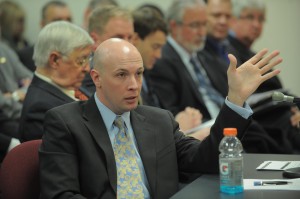A Northwest Missouri representative has presented a welfare reform package aimed at fighting fraud and saving the state money.
The fiscal note on Representative Casey Guernsey’s (R-Bethany) legislation says its proposals could put the state in danger of losing more than $3.5 billion dollars in federal matching funds for Medicaid tied to covering populations and services as mandated by the federal government. It could also cost the state more than $4.8 million dollars from the General Revenue Fund.
Guernsey says significant fraud is common in the state’s welfare programs and is wasting taxpayer money. That includes federal dollars coming to Missouri.
He says his proposal is, “looking at fundamentally restructuring the entitlement mentality in this state, and that is certainly going to save money because there is a lot of money that we do not spend well within these programs.”
Former state senator Jim Lembke, now lobbying for United for Missouri, testified to a House Committee there are places in Medicaid and welfare programs where reform could save the state money.
Lembke says while still a senator he was told by the Missouri Hospital Association that there was up to 30 percent of waste, fraud and abuse in the state’s Medicaid program, equaling $2.8 billion dollars.
He says the state’s food stamp program totals about $1 billion dollars annually. “If there is 10 percent waste, fraud and abuse in that program that’s $100,000,000 a year … is it worth while, us having these conversations and looking at these programs and making sure that we’re being good stewards of the people’s money?”
Guernsey says he began working on the issue when retail businesses in his district saw recipients of some state welfare programs abusing them and wanted something done about it. He criticizes the Department of Social Services’ investigators, saying they are ineffective.
“They, I think, do work much harder to create the illusion of doing work and pass off a lot of their work on the caseworkers than they do themselves.”
Guernsey’s bill would set into law how investigations should be conducted into reports of welfare fraud and their timeframe, and establish that the Department may fire a fraud investigator that doesn’t comply.
It would also add new eligibility requirements for welfare programs, including a requirement that all recipients of Temporary Assistance for Needy Families (TANF) prove all dependent children are enrolled in public school and attending regularly if eligible. Representative Jill Schupp (D-Creve Coeur) says that could violate the Constitution.
She asks, “Are we saying that when I’ve reached the age of 17 and I have not graduated from school and I want to drop out but my mom receives TANF benefits that I’m not allowed to go to work?”
Guernsey tells Schupp he believes a person in that scenario could work to achieve a General Equivalency Diploma (GED). Schupp says she believes that could be holding that person to a different standard than other 17 year-olds.
The bill would also require all recipients of TANF, food stamps, child care assistance, SNAP or similar programs and are 18 or older to have a high school diploma or GED.
Another provision would limit foods that can be bought with the Supplemental Nutrition Assistance Program (SNAP) to only those approved under the Women, Infants and Children (WIC) program. Missouri Retailers Association President David Overfelt testifies Missouri can’t impose such a limit.
“We do not have the authority to do this. We’d risk losing the whole SNAP program without trying to get a waiver … a waiver that’s never been granted.”
Guernsey says the federal government would benefit from considering a waiver for his proposal.
“They’re never going to reform a broken system unless they’re presented with an option that is better than the current one. There are no restrictions [on SNAP] right now. That’s completely unfair to the taxpayers.”
Other provisions in the bill would require the Department to set rules and regulations to ensure compliance with federal law while accounting for individuals and households with special needs and making sure all eligible members of a household can access benefits. It would have the Department seek a federal waiver to allow photo identification for food stamps, with photo I.D. cards to be issued by the Department to each eligible household member aged 16 and older, then require all retailers accepting electronic benefit cards to verify identities using the photos.
It would also specify that anyone who commits welfare fraud permanently loses eligibility, and require TANF recipients to make at least 20 job contacts a week while on the program or allow them to work as unpaid interns for a governmental entity and make only 10 contacts.
The committee has not voted on Guernsey’s legislation.


